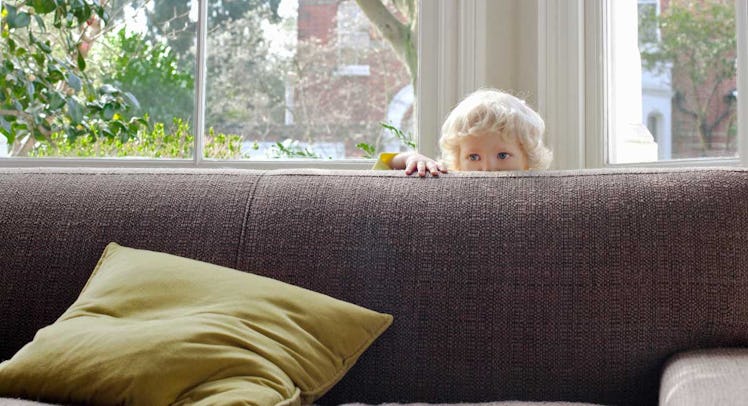Should You Force Kids To Say Hello?
It's embarrassing for the new adult and potentially harmful for the kid.

The hot flush of embarrassment is the curse of the shy kid’s parents. What can be said to a friend who has just failed to coax a hello from a leg-clinging tot? Is it possible to cut through the awkwardness of that rejection by acknowledging the faux pas? Maybe. Mostly not. So parents twist around and push their kids, cajoling them into making eye contact. But the results are often less than encouraging. And, according to Dr. Heidi Kasevich, Director of Education with introvert advocacy organization Quiet Revolution, that’s because people are treating a personality trait as a problem.
“At the root of it, parents should tease out if their child is experiencing introversion or shyness,” says Dr. Kasevich. “Shyness is the fear of social judgment and the anxiety that one gets in social situations is not inheritable. Introversion is. You’re genetically programmed to be an introvert or an extrovert.”
It is easy to mistake shyness for introversion, and vice versa, which can complicate matters or — worst case scenario — trigger misguided, damaging parental reactions. Kasevich says parents shouldn’t react to social avoidance behaviors until they’re confident they’ve diagnosed a more specific problem. She adds that this is potentially easier than it sounds. Babies as young as 4-days-old can be classified as “highly reactive” to environmental stimulation or not. At age 21, highly reactive babies tend to have become introverted adults. There is a consistency to those behaviors whereas shyness isn’t related to being overwhelmed by environmental stimuli but human judgment.
“Parents can think back,” says Kasevich. “They can start being attuned to how sensitive their child was to stimuli both social and sensory.”
The next step? Adjusting expectations. Kasevich says that when worried parents start asking questions, they often trigger shyness, clouding the issue. Which becomes problematic when layered on top of introversion. “If you ask the wrong questions, the kid thinks, what’s wrong with me? Why aren’t I instantly fitting in, which is what everyone expects?”
Kasevich points out that parents can help ease social anxiety with a bit of understanding and pretty simple preparation techniques. The most important of these techniques is offering children a “long runway” by telling them what will happen at events, arriving early, and embracing the “Irish Exit.” In the best of circumstances, the reticent child greeting a stranger has been prepped for the greeting — and so has the adult.
“When someone says, ‘Your kid is so shy,’ that can make it so much worse,” Kasevich explains. She suggests using language like “They take in everything and don’t miss a thing,” or “They care so much about how people feel,” because labels can reinforce the behavior and increase anxiety levels. When being “too quiet” becomes being a “great listener,” kids become more confident and more comfortable. Hellos won’t suddenly be on tap, but they’ll be more plentiful. People — and kids are people too — just have to meet each other halfway.
Kasevich has a simple mantra she suggests for parents of introverted children: “Don’t force. Don’t quit.” For parents of shy kids, it’s could be easier to just wait.